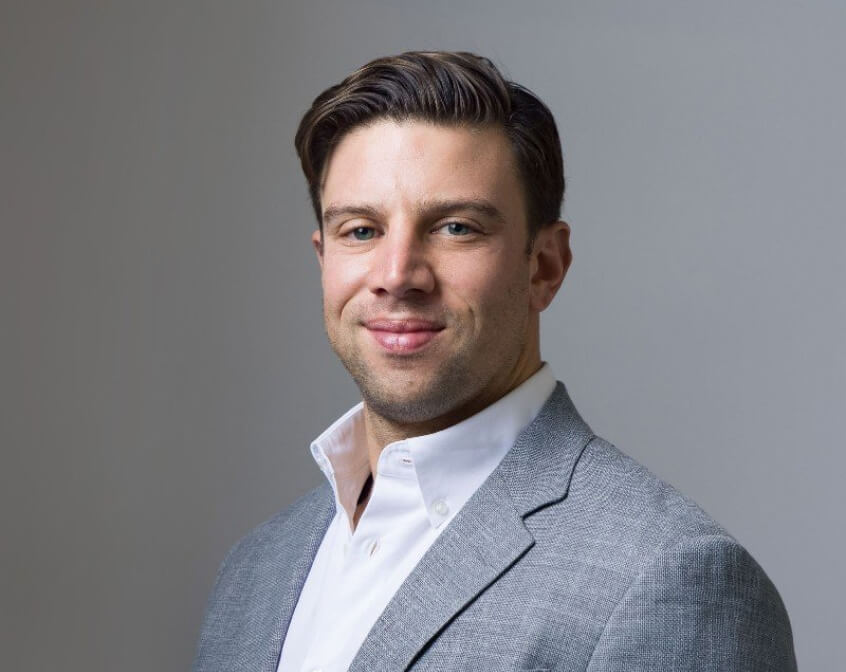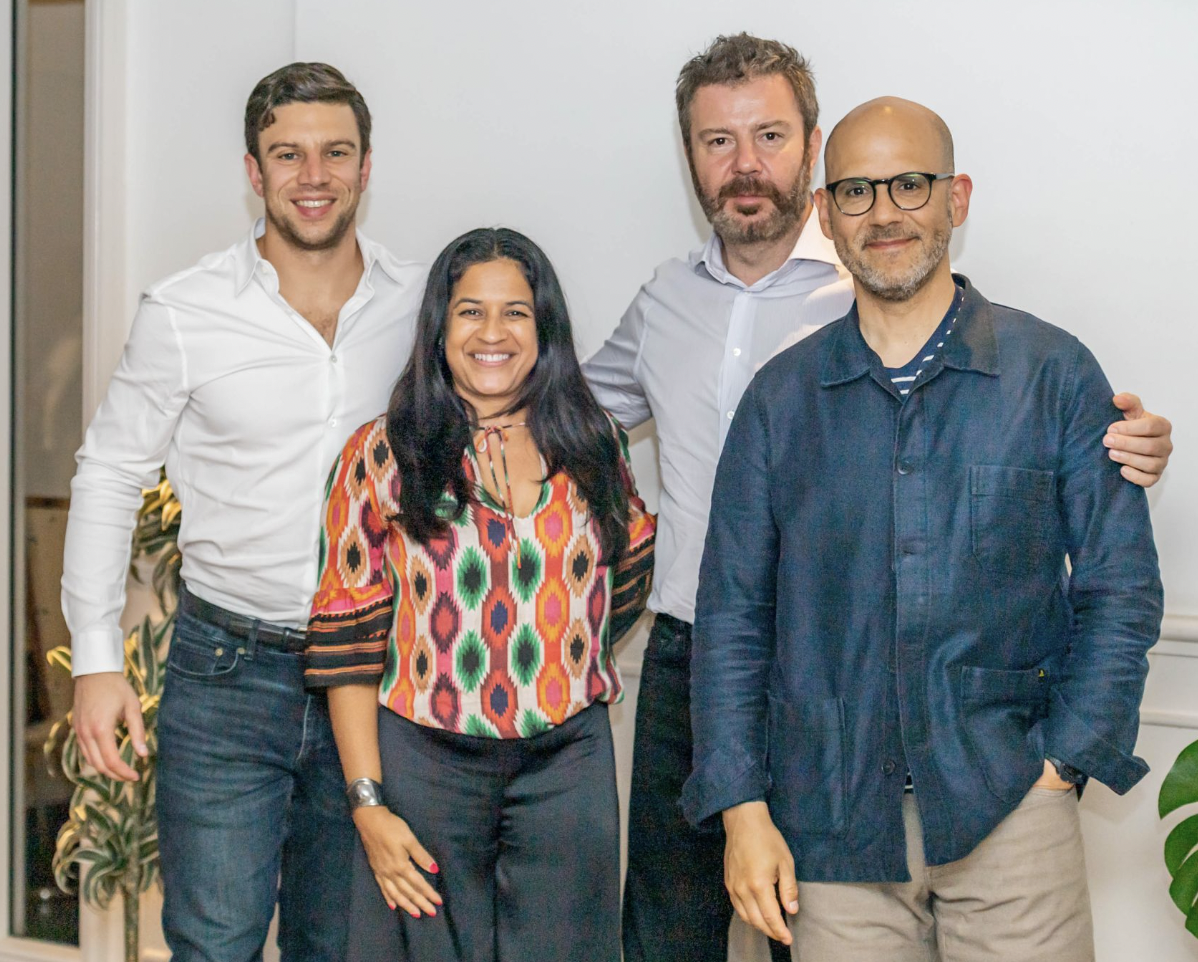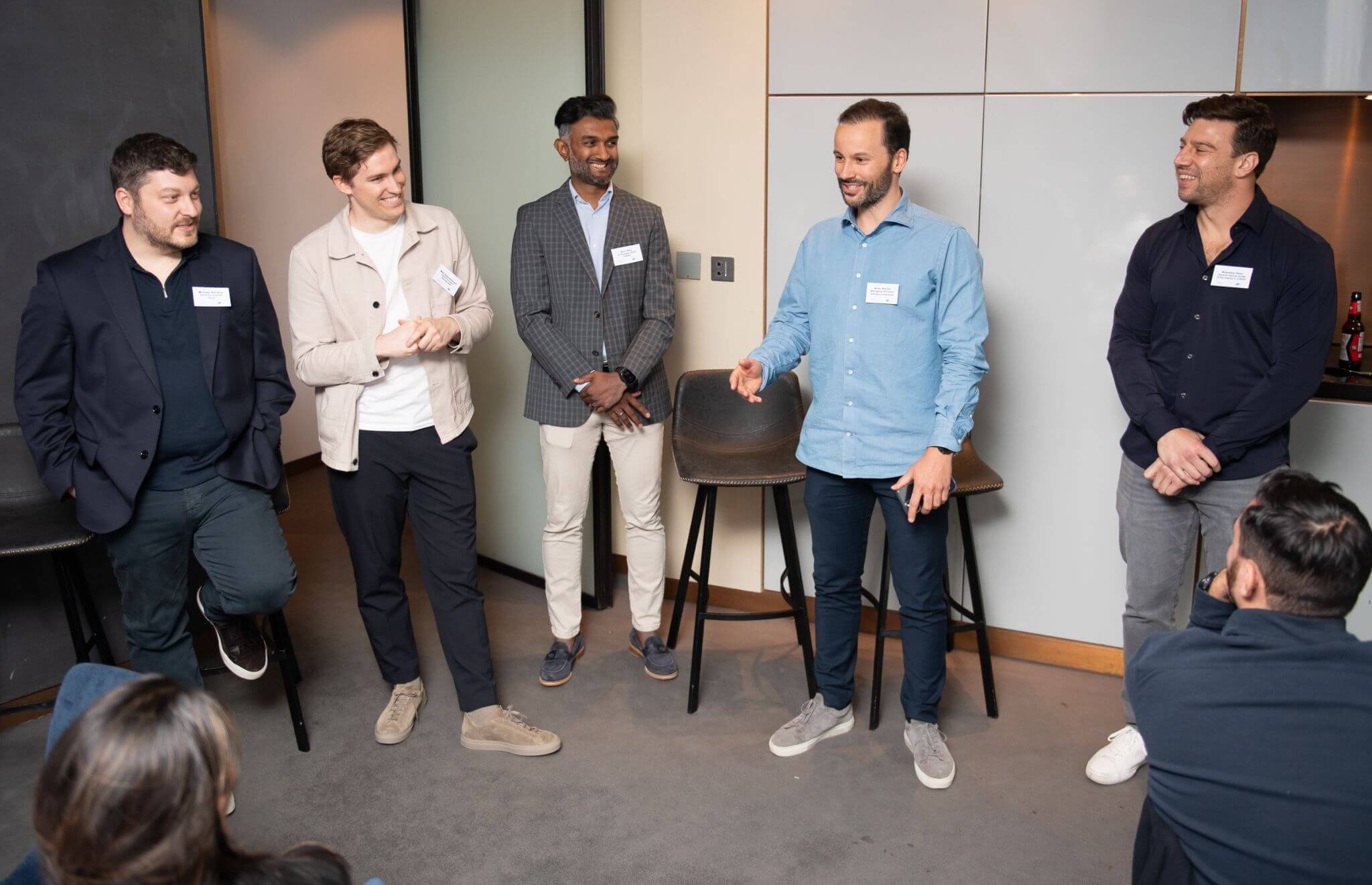Crew Capital hosted our annual European founders’ dinner this past July. Our friends at Salesforce Ventures joined us to co-host over 50 founders from around the European tech ecosystem.
To begin the evening, we held an insightful panel on company building featuring Sunil Rao, Founder and CEO of Tribble AI, Mati Staniszewski, Founder and CEO of ElevenLabs, and Michael Reitblat, Founder and CEO of Forter. Below we share some highlights from the conversation, which touch on identifying the right talent in hiring, achieving product-market fit, and overcoming the inevitable challenges that arise in building startups.
Effective talent acquisition strategies for tech startups
The panel kicked off with a question around best practices in hiring. Mati said that while his company grew from a few employees to more than 100 people in 2 years, he believes three approaches to allow ElevenLabs to acquire the right talent.
“First, we try to get each candidate through interviews with most of their team & founders to make sure that while we scale quickly, we know people well and that they’re close to the culture we want to nurture, while matching their passion to the area of highest impact” Mati said. “The second: You want to keep the team small with a high degree of ownership, independence, and risk that they might go the wrong direction every so often, but at least they are the ones with full ownership, can make decision and see the impact – and we like hiring people that enjoy such ownership and executing independently.”
Mati said ElevenLabs aims to build teams of 5 to 10 people, whether that team works on research, product, a specific vertical, or go-to-market function. Their third principle is the way they look for talent.
“We don’t look for formal background or accreditations. We just try to look for proof of excellence and passion, through side projects, open contributions, whether in coding, design or extra activities”.
Forter’s Michael Reitblat answered next, sharing that his company has about 600 employees in 15 countries. One of the biggest lessons he’s learned was to avoid being distracted by candidates with experience at huge tech companies.
“The mistake I definitely made a lot early on, but less so now, was to get blinded by big logos in a candidate CV. We have a rule that if we’re hiring or recommended to hire somebody from large companies, I need to meet them. We’ve just had bad experiences, sometimes despite their qualifications, these hires struggle to adapt to the different shape and demands of a startup culture. They may be amazing within that company, but the moment you move them to a smaller infrastructure, they’re not very effective,” Michael said.
While Michael didn’t rule out hiring candidates from big companies, he instead offered practical advice on how to parse that experience.
“Try to figure out what the big titles might mean. There are a lot of people with a lot of big titles. You have to understand what they were doing and match whether that fits what you need.”
Sunil shared that as a technical founder, he tends to get deeply involved in engineering hires. He makes hiring a dynamic process by using interviews to discuss real challenges, rather than hypothetical situations.
“One of the things that’s been really helpful is thinking about real problems that we’re currently looking at from a product standpoint and making that part of the actual interview process,” Sunil said. “It gives the candidate an easy idea of what to expect when they join, and at the same time, it helps us see if the candidate can move our own thoughts forward on the product.”
Defining and achieving product-market fit
Finding product-market fit is the biggest challenge in any startup’s early days. However, in the panel’s view, the path to achieving product-market fit doesn’t look or feel the same for every company.
“There’s a line that you cross,” Sunil said. “For us, some of the early signals were customers referring us to other customers, and that happening at an increasing scale, which was a positive signal. As we were getting feedback from users and they’re voluntarily going and giving us reviews online, we saw these as positive signals.”
Sunil noted that he and the other founders on the panel work with AI, and that its technological leaps allow them to explore new ideas that grow from customer feedback.
“Customers have a lot of ideas in terms of, ‘Hey, you could probably also do this or this.’ That seeps into the conversation of, ‘Okay, well what part of that becomes part of the core product?’ and ‘Do we think about that as product-market fit?’ The AI category is so new in a lot of the places that we’re playing in, so I think it’s a little bit different than saying product-market fit in a specific domain because the domain itself is also expanding.”
Mati agreed with Sunil on the shifting definition of product-market fit and provided an example of feedback he received with ElevenLabs’ audio AI tools that signaled clear progress toward product-market fit.
“We’d created this simple website with a text box of 100 characters where you can type in things. Then there was a book author who started copy-pasting the book into the text box, and creating an audiobook then uploading it to audiobook services. You couldn’t really do that before,” Mati said. “It started getting reviews, and then he brought five other authors with books to us – and mentioned: ‘Hey, these are your users, you need to cater to them’. And so we did and made a full fledged audiobook creation workflow.
That brought a hearty laugh from the crowd, but showed that Mati was listening to his users to help guide decisions on how the product evolved.
For Michael and Forter, achieving product-market fit looked different, in part because he started his company 11 years ago, compared to ElevenLabs and Tribble, which are both less than 3 years old.
“Our original business model was buying risk for less than what the risk was, so it was a no-brainer. I think we had product-market fit before we started the company, and if anything, our customers tried to lock in exclusivity and make sure we didn’t sell the same thing to their competitors, which was more of a challenge,” Michael said. “We did this because we have an AI product, and we’re 11 years old, so it wasn’t called AI at the time. We needed the data, and that was the easiest path for us to start both getting access to data and more importantly, experimenting and creating feedback loops. Product-market fit was easy. It’s making sure unit economics work when you have it, which is something that took us a couple of years.”
Navigating hybrid work environments
When the panel opened up to questions from other attending founders, one audience member asked how the panel approaches hybrid work and in-person collaboration. Each panel member had different experiences.
Both ElevenLabs and Tribble started after the COVID-19 pandemic began, while Michael founded Forter in 2013 and had seen more shifts in workplace arrangements by default. Forter started in a co-founder’s basement, and through all the iterations — in-person, fully remote, and hybrid — Michael believes in the power of in-person collaboration.
“People individually may work better when they’re at home. They don’t waste a lot of time and so on. But as a group, if you want to achieve a bigger outcome, especially when it requires cross-functional collaboration or ideation around things that are not concrete tasks, in-office is the way,” Michael said. “There’s a balance. You can never please everybody. You’ll lose some people regardless of the situation, but I would recommend every early-stage company to do everything in the same room.”
Tribble, in contrast, has been 100% remote from the start. Sunil said that arrangement has required more frequent offsite collaboration. All of Tribble’s engineers are co-located in one city, and they meet once a week in one physical space. Sunil said because the rest of the team is distributed across the U.S., the company does an off-site once a month.
“The trade-off is to get them together more frequently. Otherwise, you do miss that, tap-on-the-shoulder, work-on-things-together, ad-hoc component,” Sunil said.
ElevenLabs’ focus on research requires remote hires in order to keep up with the competition. However, other functions in the company offer greater in-person opportunities.
“Company is remote-first and people have a choice if they want to collaborate in person in one of our hubs. Research team is almost fully remote. The rest, across product & go-to-market spans both remote or is in one of our hubs in London, New York, and Warsaw. As we grow we expect to build more hubs but keep the remote-first culture with people being able to work from where they want” Mati said.
Resilience and trust in leadership
The founder’s journey is rarely a straight line to success. How founders navigate challenges to get through the tough times varies, but the panel agreed that seeing the big picture and having conviction in their decisions mattered. Sunil shared his ideas first.
“Understanding that everything is temporary and time-boxed, and you might not know for how long, but just having the foresight of it will change, and it will change faster than you think is possible. Having that mentality helps to just push through,” Sunil said. “You lean back on the process, you lean back on what you know as the backbone, and it gets you through the hard times.”
Mati emphasized having trust in his co-founder, which allows him to focus on his areas of expertise.
“I’m lucky to work with someone I’ve known for 12 years, even though the company is only 2 years old. When we started, we had set up things where we trust each other, and at the end of the day, if there’s a decision in one of our spaces, it helps so much that we’re together on a journey. I trust him in knowing that direction, and he trusts me,” Mati said. “That trust with the co-founder and defining what areas you take as your own is one of the most helpful for us.”
As for Michael, he shared his mindset when facing two separate challenges with Forter: How to contend with downturns in business, and dealing with companies that had written Forter off.
“When COVID started, 25% of our business, which was travel, became zero. Another favorite for VCs is we had three times when the first quarter after an investment was a bad quarter,” Michael said. “I always have a conviction that this has to work. I still think 100% of people selling online have to be customers. It makes no sense for it to be otherwise.”
He shared that during an early fundraising round, a potential VC investor said they didn’t want to invest because they’d talked to three companies that said they’d never work with Forter.
“I kept a list of all the companies that said they would never work with me,” Michael said. “I think I only have one that I haven’t converted yet. That’s what proved to me that they’re all wrong. They don’t know what they’re talking about. The customer may say they don’t want it, the VC may say it will never work. We’ll just make it happen. And after you’ve done this a couple of times, you just have to get immune to it.”
Related Articles

Supporting Startup Employee Morale through Turbulent Markets

Highlights from the Crew Capital Founder’s Dinner: Company Building with Daniel Dines & Brandon Deer
This summer, we at Crew Capital co-hosted a dinner with Seedcamp in London with 50 European founders. As part of…







